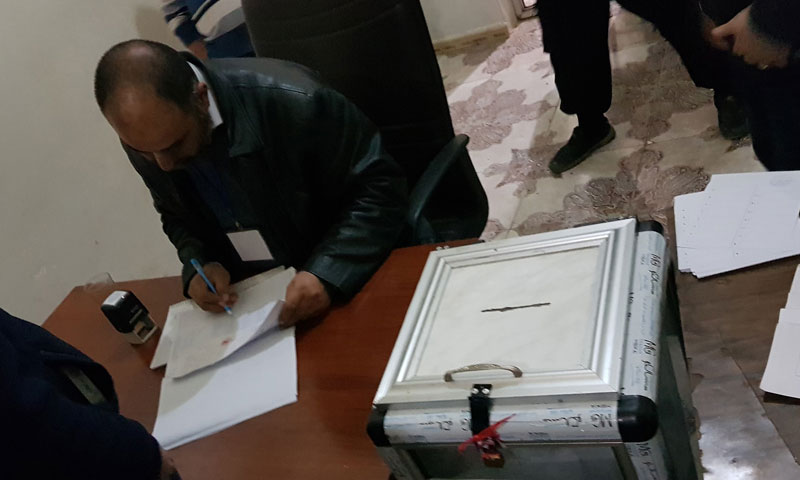



Idlib – Shadia Taataa
The rapid control that the “Hay’at Tahrir al-Sham” (HTS) had over the rest of Idlib governorate, north-western Syria, has directly reflected on the life’s service and civil sectors there.
The control was the outcome of the latest confrontations between HTS on the one hand and the “National Front for Liberation” on the other, leading to HTS’ seizure of Idlib, western rural Aleppo and northern rural Hama early this year.
Under these circumstances, the “Salvation Government” managed to administratively reign over Idlib governorate and western rural Aleppo, year and a half after its foundation, following a deal between HTS and the “National Front for Liberation,” which provided for bounding the whole area to the government.
The “Salvation Government” started to seek control when it directed a warning to the “Syrian Interim Government” on December 12, 2017, giving the latter a duration of 72 hours as to close its offices in Idlib governorate and leave the area.
Early January 2019, HTS forced most of the local councils in the areas it recently controlled to break from their affiliations with the “Interim Government,” particularly the councils in western rural Aleppo, which incubated the largest number of the “Interim Government’s” offices that provided them with funding.
Yasser Abdulrazzaq, the former director of Atarib City Local Council, explained to Enab Baladi the mechanisms of action followed lately at the local council.
He said: “Nothing has changed. We have already announced the suspension of our work at the local council early January, and a new director to the council was chosen by the revolutionary committee, while we suggested a few names.”
He added that the “Salvation Government” has assigned a few names, including the director and other members without informing the former council.
The “Salvation government’s” imposition of its control over the local councils “is not right,” Abdulrazzaq said, as it weakens the local council’s relations with the donor organizations, which support the projects run by the former local councils, especially since the new policy of the “Salvation Government” is yet unknown to the donors.
The “Salvation government” avoided having direct clashes with the local councils that refused and resisted its hegemony, such as the councils of Maarrat al-Nu’man and Maar Tahroma, southern rural Idlib. However, the government forced them to recruit people from its side, which sounds like a gradual attempt at control.
This method is similar to the “soft” war that HTS lately initiated against the armed opposition factions.
On the condition of anonymity, an official from Idlib’s Local Council commented on the council’s work mechanisms under the rule of the “Salvation Government”. He said: “Concerning our council, the Salvation Government is addressing the issue before it steps further to control all the councils in Idlib’s rural parts. We have not received an order from the Salvation Government of dissolving the old council so far. On the contrary, there are projects that will be implemented on the ground in the near future, such as the activation of the vegetable market in the city and eliminating the random stalls phenomenon.”
“Since there is a government now, which is in control, we cannot deny it, our work will be done under its supervision as to facilitate the affairs as much as possible,” he added.
But still, the “Salvation government” and HTS’ control of these areas has negatively affected several sectors, for European organizations has suspended their donations to humanitarian projects in Northern Syria.
Munther Khalil, head of the Idlib Healthcare Directorate, told Enab Baladi that some European organizations, especially French, German and the European Union, have cut their funding to all the healthcare directorates in Idlib, Aleppo, Hama and latakia.
The major reason behind the funding cuts, according to the organizations, is the change that befell the military control on the ground, al-Khalil added.
In a former interview with Muthhar Sharbaji, director of Governance and Capacity Building at the Local Councils’ Unit, under the “Interim Government,” he mentioned the harm that befell some of the local councils in Idlib after the “Salvation Government” controlled the area.
He said: “The donors work with the moderate local councils affiliated to the Interim Government, which the international community acknowledges. In the presence of the Salvation Government, the donors refused to provide funding to any council that is not affiliated to the Salvation Government.”
“The organizations have vetoes against some of the areas controlled by the Salvation Government,” he added.
Sharbaji estimated the local councils affected in Idlib with 50 to 60% of the councils, where the “Salvation Government” is in control. He believes that the donors fear that the “Salvation Government” might appropriate the money offered to the humanitarian projects and redirect it to other ends.
According to the last census that the “Response Coordination Team” published on December 26, 2018, there are three million and 800 thousand civilians in the governorate of Idlib, in addition to 753 thousand others in various areas in Aleppo and 149 thousand 482 civilians in rural Hama, controlled by the opposition.
if you think the article contain wrong information or you have additional details Send Correction